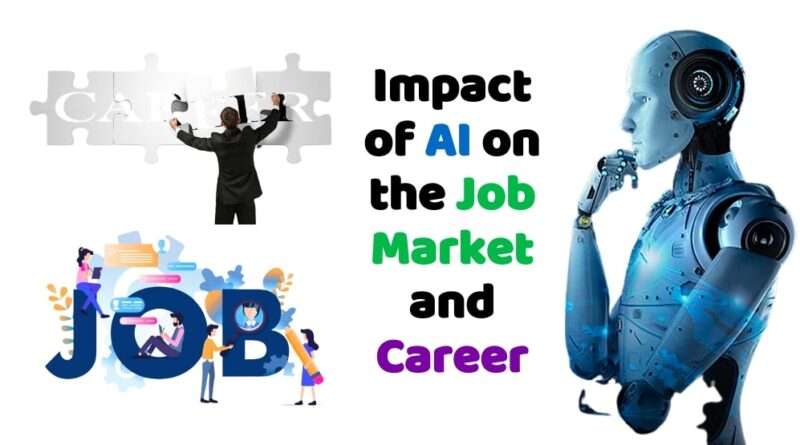Impact of AI on the Job Market and Career
Impact of AI on the Job Market and Career
As the world continues to rapidly evolve, the impact of Artificial Intelligence (AI) on the job market and career landscape is becoming more evident.
While AI presents numerous opportunities for innovation and growth, it also raises concerns about the future of employment. As we venture into this new era, the question on everyone’s mind is whether AI will enhance or replace jobs.
With machines capable of automating routine tasks and making decisions based on data, what does the future hold for the workforce?
Will AI create new job opportunities and require new skill sets, or will it lead to widespread job displacement and create a workforce that is ill-equipped for the new era?
In this article, we will explore the impact of AI on the job market and career landscape, looking at both the positive and negative impacts and what it means for the future of work.
Impact of AI on Job Market and Career
The increasing use of Artificial Intelligence (AI) is already having a significant impact on the job market and career landscape. Here are some potential effects of AI on jobs and careers:
Automation of routine tasks: AI can automate many routine tasks such as data entry, data analysis, and customer service. This could lead to the displacement of workers who perform these tasks, but also create new opportunities for workers to specialize in more complex tasks.
Increase in demand for AI-related skills: The rise of AI will increase the demand for workers with skills in fields such as data science, machine learning, and programming. This could create new career opportunities for those with these skills.
Emergence of new job roles: As AI becomes more prevalent, new job roles will emerge such as AI ethicist, AI trainer, and AI auditor. These jobs will require unique skills and training.
Increased competition for jobs: The use of AI in hiring processes could increase competition for jobs as AI algorithms may favor candidates with certain skills or experiences.
Potential for job displacement: Some jobs may be entirely replaced by AI, particularly in industries such as manufacturing and transportation.
Changes in work patterns: AI may lead to changes in work patterns such as remote work, gig work, and increased flexibility in work schedules.
Overall, the impact of AI on the job market and career landscape is complex and varied. While it may displace some jobs, it will also create new opportunities for workers to specialize in high-skilled tasks, develop new AI-related skills, and pursue new career paths.
Comparison Chart
Here’s a table chart comparing the positive and negative impacts of AI on the job market and career landscape:
| Positive Impacts of AI | Negative Impacts of AI |
|---|---|
| – Automation of routine tasks can free up time for workers to focus on more complex and creative tasks. | – AI could displace workers who perform routine tasks such as data entry, data analysis, and customer service. |
| – Increase in demand for workers with skills in data science, machine learning, and programming. | – AI could lead to increased competition for jobs as algorithms may favor candidates with certain skills or experiences. |
| – Emergence of new job roles such as AI ethicist, AI trainer, and AI auditor. | – Some jobs may be entirely replaced by AI, particularly in industries such as manufacturing and transportation. |
| – AI can help companies make better decisions and improve efficiency. | – There may be concerns around privacy and security as AI collects and analyzes large amounts of data. |
| – AI can improve the accuracy and speed of tasks such as medical diagnoses and financial analysis. | – AI could lead to job polarization, with a widening gap between high-skilled and low-skilled jobs. |
| – AI could lead to new career opportunities for workers to specialize in high-skilled tasks. | – There may be challenges in regulating and governing AI and its impact on the job market and economy. |
Overall, the impact of AI on the job market and career landscape is complex and multifaceted, with both positive and negative impacts. It is important for individuals and organizations to be aware of these impacts and take steps to prepare and adapt to the changes brought about by AI.
Top Ten Most Affected Careers
AI is expected to impact many different job fields in various ways. Here are ten job and career fields that are expected to be most affected by AI:
Customer service: AI-powered chatbots and virtual assistants are already being used in customer service, and are expected to continue to become more prevalent, which could lead to job displacement.
Data entry and analysis: AI can automate many data entry and analysis tasks, which could lead to job displacement, but also create new opportunities for workers to specialize in more complex data analysis.
Transportation: Self-driving vehicles are expected to become more prevalent, which could displace workers in transportation-related jobs such as truck driving.
Manufacturing: AI-powered robots can perform many manufacturing tasks, which could displace workers in manufacturing-related jobs.
Finance: AI can automate many financial analysis and investment tasks, which could lead to job displacement, but also create new opportunities for workers to specialize in more complex financial analysis.
Healthcare: AI can help automate medical diagnoses, which could lead to job displacement, but also improve the accuracy and speed of medical diagnoses.
Legal: AI can help automate legal research and document review, which could lead to job displacement, but also improve the accuracy and efficiency of legal work.
Retail: AI-powered robots can perform many retail-related tasks such as stocking shelves and processing orders, which could displace workers in retail-related jobs.
Education: AI can help personalize education and automate grading, which could lead to job displacement, but also improve the efficiency and effectiveness of education.
Agriculture: AI can help optimize crop yields and automate many farming tasks, which could lead to job displacement, but also improve the efficiency and sustainability of agriculture.
Overall, while AI is expected to have a significant impact on many different job and career fields, it is also expected to create new opportunities and specialized roles. It is important for individuals and organizations to be aware of these changes and adapt accordingly.
Solution of AI Impact on Career
The impact of AI on the job market and career landscape can be significant, but there are steps that individuals can take to prepare and adapt to these changes. Here are some ways a common man can handle the situation:
Stay informed: It’s important to stay up-to-date on the latest developments in AI and how they might impact your industry and career. Read industry publications and attend conferences and webinars to stay informed.
Upskill: Develop skills that are in demand in the AI-driven economy. Consider enrolling in courses or training programs to develop skills in areas such as data analysis, machine learning, and programming.
Be adaptable: Be open to learning new skills and taking on new roles. AI will likely create new job opportunities that require unique skills and training.
Cultivate transferable skills: Develop skills that are transferable across different industries and roles, such as communication, problem-solving, and critical thinking.
Build a strong network: Networking is essential for staying informed about job opportunities and building relationships with people in your industry.
Consider entrepreneurship: Consider starting your own business or freelance work to take advantage of the opportunities that arise from AI-driven disruptions.
Focus on emotional intelligence: AI cannot replace emotional intelligence, so focus on developing interpersonal skills such as empathy, listening, and communication.
In summary, the key to handling the impact of AI on the job market and career landscape is to stay informed, upskill, be adaptable, cultivate transferable skills, build a strong network, consider entrepreneurship, and focus on emotional intelligence.
By taking these steps, individuals can position themselves for success in an AI-driven economy.




